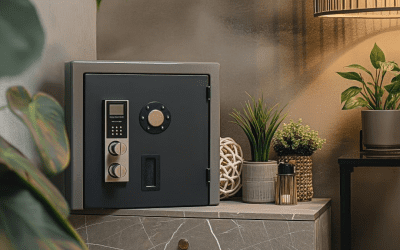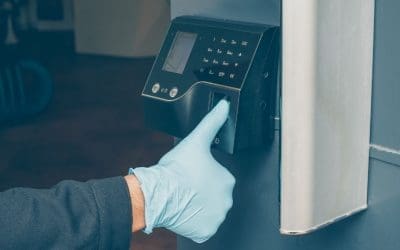In the context of locks, a keyway is the profile or shape of the slot into which a key fits; more specifically, it’s the “path” inside the lock cylinder that matches the shape (cuts, grooves, shoulders) of the key. The keyway determines which key blanks fit, how secure the lock is against tampering, and what level of compatibility or restriction there is in copying keys.
Here are a few reasons keyway design is important:
-
Security/Tampering Resistance: A harder or more intricate keyway (e.g. paracentric shapes) can make picking, bumping, or forced entry more difficult.
-
Key Control: Restricted keyways or patented profiles limit who can legally or technically create duplicate keys.
-
Compatibility & Commonality: If you need a replacement, service, or new lock, having a common keyway means locksmiths and hardware stores are more likely to have the blanks. For emergencies (like when a 24/7 emergency locksmith is needed) this is especially useful.
-
Usage Suitability: Residential vs commercial use often determines what keyway is ideal – durability, frequency of use, regulatory/security needs, etc.
Popular Keyway Types for Home & Business
Choosing the right keyway is a critical step in selecting locks for your home or business. Keyways not only determine which keys can be used with a lock but also play a major role in security, key control, and locksmith compatibility.
Below are some of the most commonly used keyway types in residential and commercial settings:
1. KW1 (Kwikset Standard Keyway)
Best for: Basic residential use
-
Overview: One of the most widely used keyways in the U.S. for residential locks.
-
Features: 5-pin configuration; easy to duplicate; widely available.
-
Pros: Affordable, easy to replace or rekey.
-
Cons: Less secure, easily picked or bumped.
-
Locksmith Tip: Great for budget-conscious homeowners, but consider upgrading if you’re in a high-risk area.
2. SC1 (Schlage Standard Keyway)
Best for: Homes and light commercial use
-
Overview: Another common keyway, known for better build quality than Kwikset.
-
Features: 5-pin (can be upgraded to 6-pin); used in both homes and light commercial spaces.
-
Pros: Durable, more resistant to picking than KW1.
-
Cons: Still not considered high-security.
-
Locksmith Tip: Many 24/7 emergency locksmiths carry SC1 blanks due to their popularity.
3. Schlage Everest & Primus Keyways
Best for: High-security residential and commercial
-
Overview: Patented keyways offering added protection with sidebar mechanisms.
-
Features: Restricted duplication, key control, anti-pick technologies.
-
Pros: Extremely secure; ideal for areas needing tight access control.
-
Cons: Higher cost; keys cannot be duplicated without authorization.
-
Locksmith Tip: Only licensed locksmiths can duplicate these keys. Great for businesses needing controlled access.
4. Yale Y1 / Y-Series Keyways
Best for: Traditional homes and older buildings
-
Features: Slightly curved profile; moderate security.
-
Pros: Common in older locks, still widely available.
-
Cons: Older models may lack modern security features.
-
Locksmith Tip: Easy to rekey and service, even during a late-night call from a 24/7 emergency locksmith.
5. Best “A” Keyway (Small Format Interchangeable Core – SFIC)
Best for: Commercial and institutional buildings
-
Overview: Used in SFIC systems that allow for quick core replacement.
-
Features: Multiple restricted keyways available (e.g., A2, A3 systems).
-
Pros: Fast rekeying without hardware removal; master keying is easy.
-
Cons: Installation costs can be high; complex for DIY use.
-
Locksmith Tip: Ideal for schools, hospitals, and office buildings needing key control and scalability.
6. Medeco Keyways
Best for: Maximum security in commercial or high-end residential
-
Overview: Medeco uses patented angled cuts and rotating pins for advanced protection.
-
Features: High-security certifications (e.g., UL 437); key duplication only through authorized dealers.
-
Pros: Virtually pick-proof and bump-proof; excellent key control.
-
Cons: Expensive, and not every locksmith can service them.
-
Locksmith Tip: If you’re serious about key control and physical security, Medeco is top-tier.
7. Mul-T-Lock Interactive+ Keyways
Best for: High-security residential and commercial doors
-
Overview: Advanced dimple key systems with telescopic pins for extra protection.
-
Features: Keys require a special code card for duplication.
-
Pros: Highly pick-resistant; strong materials; difficult to duplicate.
-
Cons: Costlier than standard locks.
-
Locksmith Tip: A solid choice for property managers and business owners who want security and accountability.
How Locksmiths Deal with Keyways
Here’s how keyway considerations come into play for them:
- Stocking Common Blanks
Emergency locksmiths tend to carry the most common keyway blanks (e.g. Y1, KW1, SC1) so they can quickly cut a replacement or rekey a lock during off-hours. - Restricted Keyways & Legal/Patent Issues
Some keyways are patented (or were patented), or are sold with restrictions. Locksmiths must know whether they are allowed or legally able to supply blanks or make duplicates, especially for higher-security or restricted systems. - Interchangeability & Master Keying
In commercial settings, many locks may need to be keyed alike or master keyed. Keyways must be compatible, and the locksmith must keep detailed records of these systems. - Security vs. Convenience Trade-off
While a more restricted keyway increases security, it might also increase time & cost (for blanks, for ordering specialty tools, etc.). A 24/7 emergency locksmith will weigh these trade-offs because rapid resolution is often needed. - Maintenance & Replacement
Over time, worn pins, keyway damage, or mismatched blanks can degrade performance. Locksmiths need to assess whether to repair or replace the whole cylinder. Good keyways resist such wear better.
Why It Matters for Homeowners & Business Owners
Here are the practical reasons why understanding keyways can influence what you choose (or what service you require):
-
Ease of Service / Emergency Access
If you ever lock yourself out or lose a key late at night, having a lock with a common keyway saves time with a 24/7 emergency locksmith. Fewer delays in finding correct blanks or compatible parts. -
Cost of Duplication
Common keyways -> lower cost, wide availability. Restricted or patented keyways cost more and require authorized dealers or locksmiths. Might be worth it for security, but plan accordingly. -
Security Assurance
If your property is at risk (high crime area, valuable contents, sensitive data), investing in locks/keyways with restricted profiles adds layers of security: pick-resistance, restricted duplication, better durability. -
Long-Term Value
Well-made locks with good keyways tend to hold up better. Less frequent replacement means lower overall cost, fewer emergency locksmith callouts, less disruption. -
Aesthetics vs Function
Sometimes owners are drawn to decorative hardware; they might compromise on security features/keyway choice. It’s important to balance looks with real security. Aesthetic hardware that supports strong, secure keyways is the ideal.
Things to Consider When Choosing a Keyway
To make sure you get the right keyway for your needs:
- Check Lock Manufacturer & Model
Identify what keyway your lock already has so you can replace or upgrade without compatibility issues. - Determine How Important Key Control Is
Are unauthorized copies a concern? If yes, go for restricted or patented keyways. - Assess Frequency of Use & Environment
Doors used many times per day (commercial/business) demand stronger, durable keyways and probably higher quality material & cylinder. Exterior doors need corrosion resistance too. - Consider Locksmith Support Availability
Before selecting a rare or unusual keyway, check whether local locksmiths (and emergency locksmiths) service that profile and have blanks in stock. - Regulatory or Insurance Requirements
Sometimes businesses or insurance policies demand locks meet certain standards (e.g. specific keyway strength or security level). It’s sensible to check those.
Conclusion
Keyways are more than just the shape of your key – they affect cost, security, convenience, locksmith serviceability, and overall peace of mind. For homes, businesses, or any property where you want reliable, accessible security:
-
Choose a profile that balances security vs availability.
-
Confirm your locksmith (especially if using 24/7 emergency locksmith services) supports that keyway.
-
Understand the difference between common vs restricted keyways and pick what suits your risk level.




